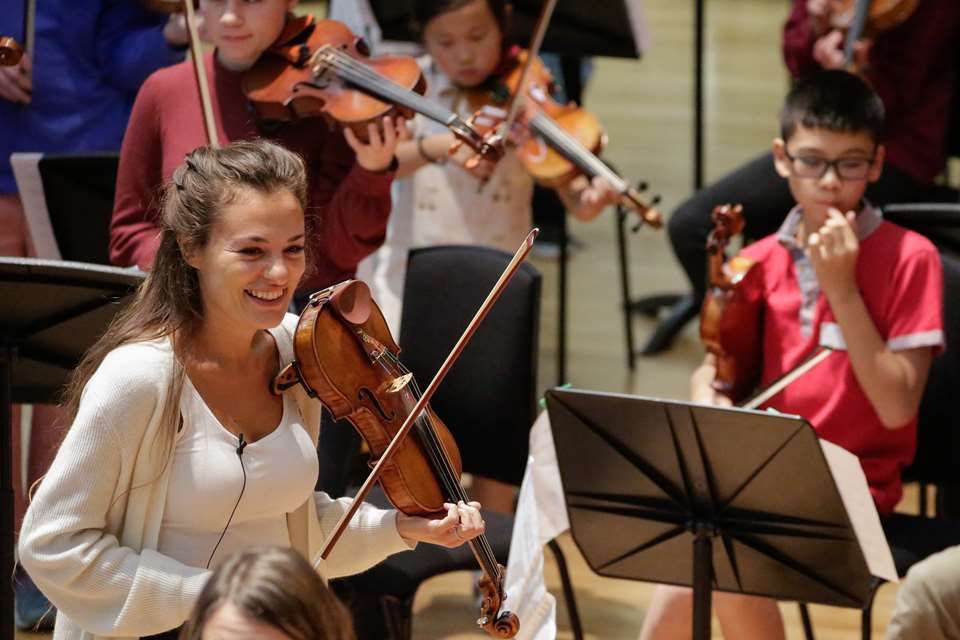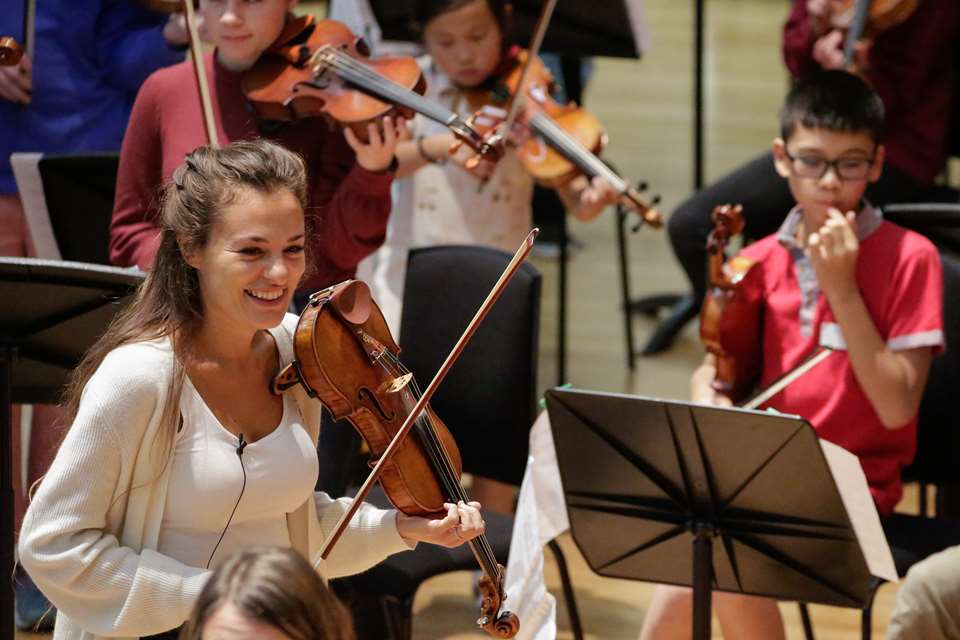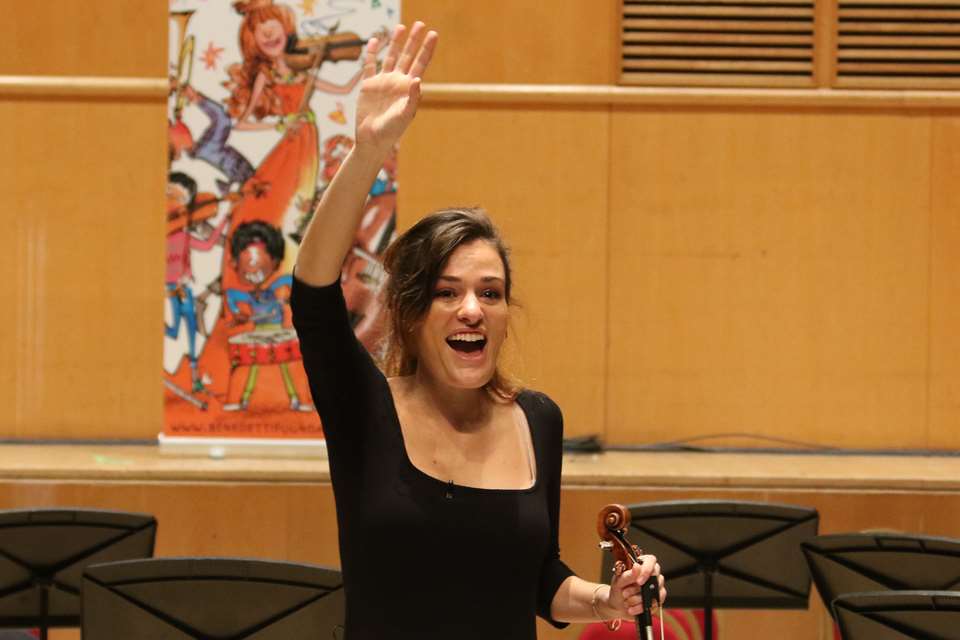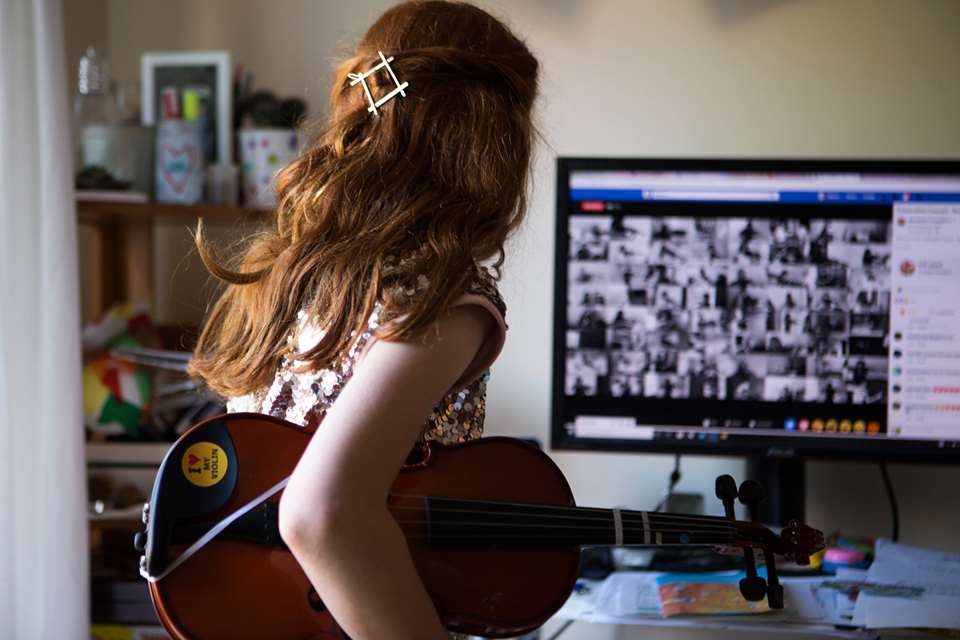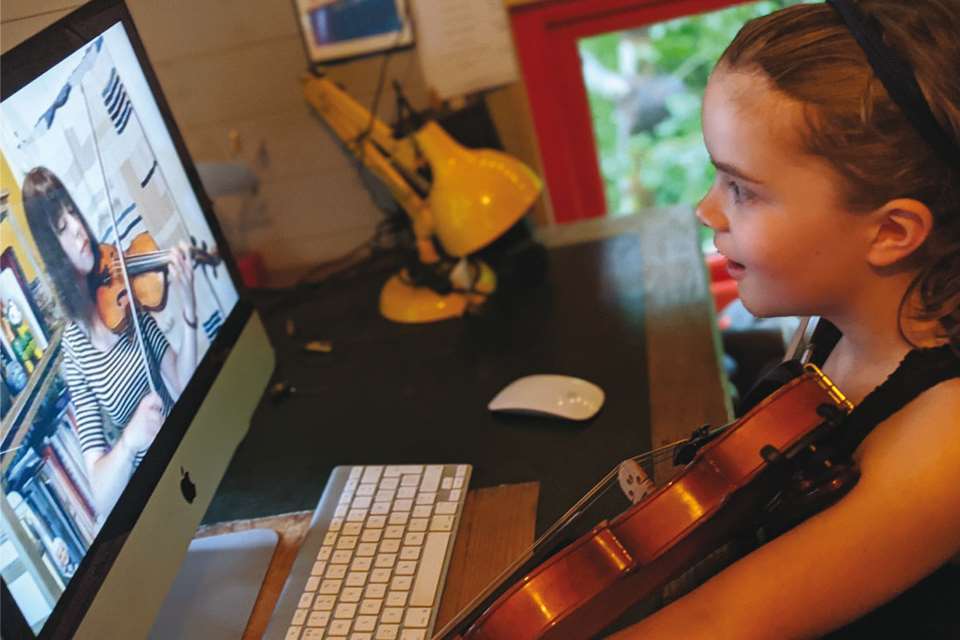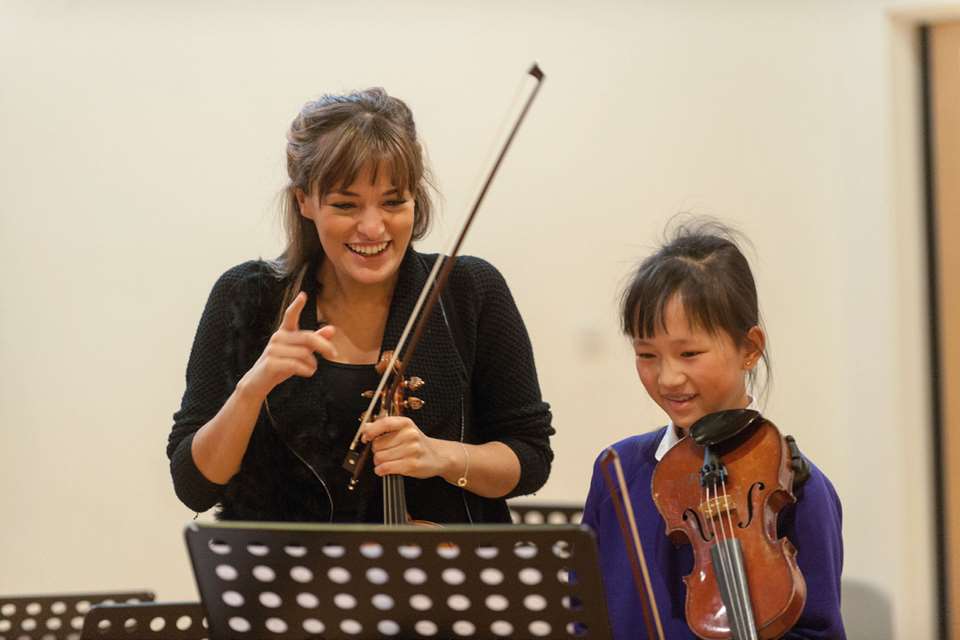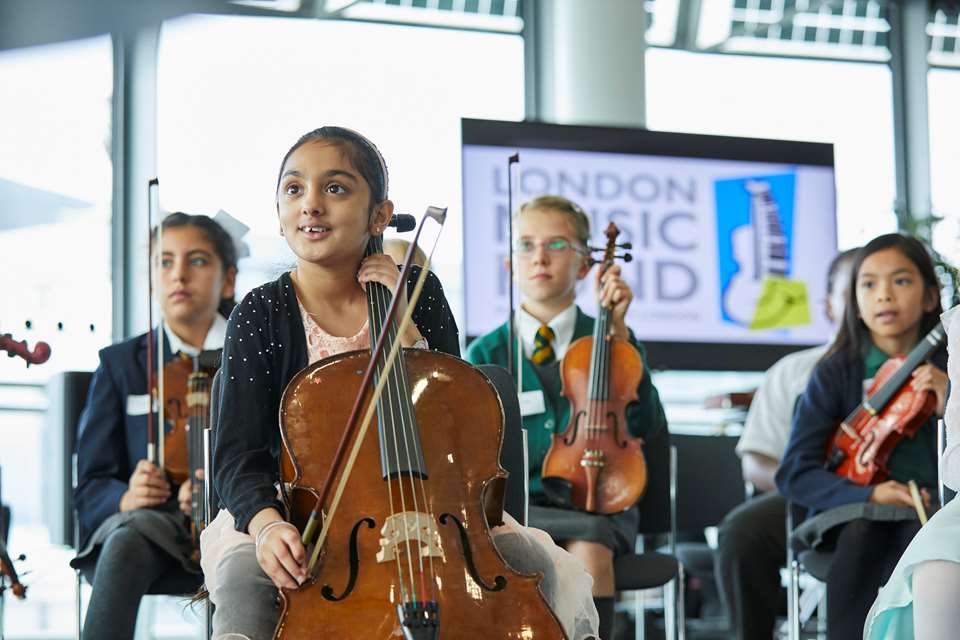Nicola Benedetti interview: 'Uncompromising on quality'
Harriet Richards
Saturday, October 1, 2022
Superstar violinist Nicola Benedetti is one of music education's most high-profile champions. Harriet Richards meets her to find out more about the woman behind the Stradivarius.

Craig Gibson
In the last month alone, Nicola Benedetti has performed at the Proms with the Royal Scottish National Orchestra (RSNO), shaken hands with Nicola Sturgeon as the Scottish first minister congratulated her on becoming the first female director of Edinburgh International Festival, appeared on an episode of This Cultural Life, had a new Violin Concerto by James MacMillan dedicated to her, and has also fitted in an interview for MT. After all, Benedetti's education work is rooted in a ‘long-held sense of duty’, she says, and is a ‘natural extension’ of playing on the stage. Her commitment to the cause goes beyond advocacy and the odd workshop, and in 2019, when the pandemic loomed just out of sight, the violinist set up the Benedetti Foundation, her music education charity with the strapline ‘unite, inspire, educate’.
Brought up in North Ayrshire by Italian parents, the internationally renowned violinist has a no-nonsense air about her – she pre-emptively quashes any implication that her devotion to education sets her apart from her peers. ‘The last thing I would ever want to do is carry out comparisons between musicians who dedicate themselves to education and the musicians who solely dedicate their energies to their instrumental playing as an absolute singular pursuit.’ She adds that there's ‘space in the world for all those people’, and unambiguously aligns herself with the first camp. As I draw breath for the next question, Benedetti continues: ‘I will just say one other thing – so often I am asked about [my educational] work in relation to the satisfaction or sense of pleasure that it gives me, and I would resist that to a certain degree. The work I do in this area is probably some of the most exhausting and draining – it's not something that you do purely for the feel-good factor.’ Reinstating her ‘admiration’ for teachers who do this work ‘day in, day out’, she adds that ‘celebrating, elevating, and supporting’ teachers is one of the ‘hallmarks’ of the Benedetti Foundation.
Despite what could have been a false start, the Benedetti Foundation was not deterred by the disruption of Covid and officially launched in January 2020. While some well-established charities scrambled to turn well-oiled in-person workshops and outreach programmes into online opportunities for young musicians, the Benedetti Foundation swiftly transitioned to digital delivery. ‘Our preparation for the very first workshop was hybrid already,’ says Benedetti. ‘It was just a slight shift in focus, but digital was always going to be an important part of how we communicated with people.’ This was partly because the Foundation wanted to reach people globally, but also because it was a way of removing logistical barriers. ‘Even if you're able to pay for something, sometimes it's just too complicated for somebody to come physically – having so much high-quality material available online breaks down that barrier massively and has a huge impact on who we can support and be available to.’

Craig Gibson
Defined approach to diversity
Since its launch, the Benedetti Foundation has reached more than 25,000 participants, aged 2–92 and in 102 countries, through more than 750 live and pre-recorded video lessons, 600+ Zoom session, 140+ ‘Mini Sessions’, five three-week-long Virtual Sessions, and three live, in-person sessions. Their YouTube content, housed on Benedetti's own channel, has been viewed more than 4.8m times.
Aimed in the most part at string players, the Foundation's reach has been both immense and carefully targeted, particularly when it comes to the in-person workshops. ‘With all of our live sessions, we've had a defined and clear approach to the diversity of who attends from the get-go,’ says Benedetti. ‘Obviously, one component is that the sessions are open application, but there are all sorts of things that you can do to ensure that you have a broad range of people attending.’ She lists close collaboration with the local council or borough, partnering with teachers who are doing ‘pioneering work’ in the area of the workshop, and ensuring communication with music charities already doing work in the community. ‘If you communicate with all those different sections early on, then you can pretty much guarantee that you will have a very diverse presence at the workshop.’
‘We're obviously not sitting here saying that these workshops are not for anybody who goes to a private school,’ adds Benedetti, ‘but we're saying that they actually have to represent the broadest range of society, and I think we've been really successful in achieving that.’

Franz Galo
‘Mass collective belief’ in Scotland
Neither of Benedetti's parents played an instrument, but she picked up the violin at the age of four because of Ayrshire's ‘strong’ tradition of the Suzuki method – she started playing on the same day as her older sister Stephanie, who now plays violin in Clean Bandit. Nicola told John Wilson on This Cultural Life that because she is left-handed, in her first lesson she ‘kept taking the violin back from the teacher and going the wrong way’, adding that it was ‘nothing short of traumatic’ because she ‘cried from beginning to end’. From the second or third lessons, both sisters demonstrated an ‘aptitude’ to playing. Stephanie was ‘the more natural musician’, according to Nicola, ‘but didn't like the practice part as much’.
The fact that Benedetti wasn't born into a musical household steers the conversation on to last year's news that the Scottish government has pledged £12m to remove music tuition charges in schools. Benedetti says there is ‘not even a discussion’ around that being a positive step. ‘If you speak to the musicians of the RSNO, for example, how many of those musicians will say that instrumental tuition being freely available to them locally was the sole reason they got into playing? It's a high percentage,’ says Benedetti. ‘I think there's a misconception that more classical musicians in their 40s or above came from hothouse musical backgrounds – but for so much of the UK, that isn't accurate.’ Benedetti emphasises that free instrumental tuition in Scotland is the result of musicians and music education advocates ‘dedicating decades of their lives to ensuring that things change for the better’ – this is no ‘flash-in-the-pan strategy’ plucked out of thin air on a whim. England has committed advocates too, but Benedetti believes that their colleagues in Scotland have been more successful (at least in the area of free tuition) because of ‘enough mass collective belief in certain principles’.
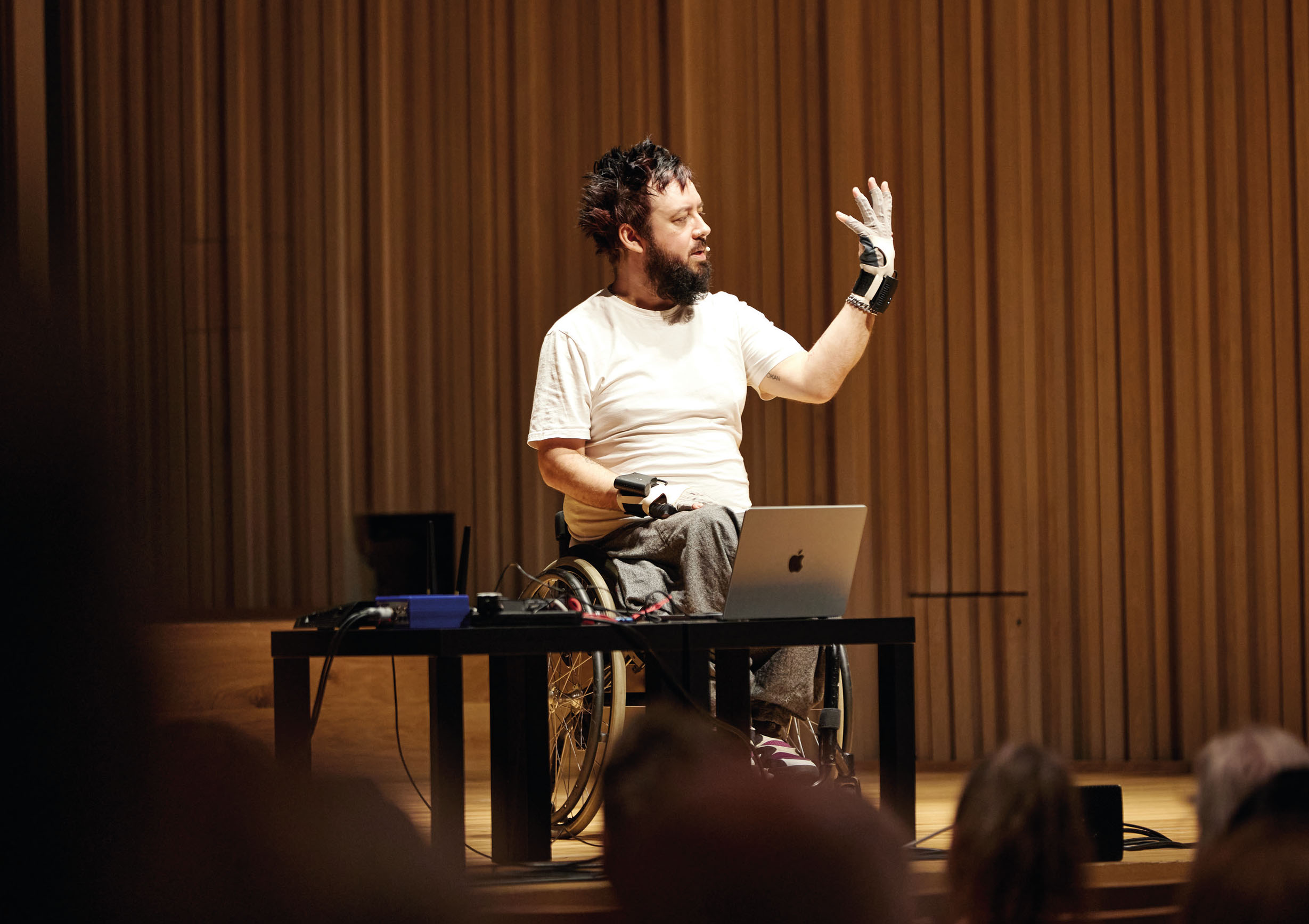

Sara Platt
Changing perceptions
The concept of shifting perceptions is something Benedetti comes back to often throughout our interview. She talks about how there needs to be a perception shift around teaching so that more young musicians give the career option a ‘place of pride and priority’, as well as a national perception shift towards the value of music education.
Benedetti recalls speaking at an education conference in Scotland: ‘I was one hundred per cent preaching to the choir, despite the fact that a lot of people present were not representative of music education at all – they were just mainstream education – but there was an absolute consensus that music was going to be vital for young people in the period after Covid. That has been central to the recovery period for education authorities in Scotland.’ She adds that in Scotland, generally, talking about the place of the arts ‘is not an uphill battle’. Clearly, the implication here is that music education does face an uphill battle in England – something I doubt many of us would disagree with.
I assume, then, that Benedetti will be thrilled by the recent publication of England's National Plan for Music Education. But she says: ‘I would like to see us get away from words like “strategies” and “plans” and put more focus on tactical, actionable, tangible resources and offerings for teachers. I think perception shift is the first port of call, but following on from that, I don't think we need more and more documents outlining how, in a dream vision, we have violin or recorder teachers in every school. Let's work with what we have and see what we can provide and implement without having to jump through 1000 hoops.’
Benedetti continues: ‘Obviously you need vision, and you need to have almost unrealistic hope for things to improve, but I think it's about getting away from these proposals and plans that everybody commends and celebrates, and then looks around thinking “but how do we do this?”

Franz Galo
‘Desegregation’ of disciplines
This academic year, the Benedetti Foundation will reach 18,000 primary children across England, Scotland, and Northern Ireland through its residency programme with music services and hubs. ‘We believe in the power of a singular moment,’ says Benedetti. ‘You demonstrate community, you demonstrate the pulling of people together, you demonstrate that you are not hierarchical in thinking that some people should be there and some people shouldn't. If you go into a community and demonstrate that with positivity, with a sense of togetherness, but absolutely uncompromising on quality, it's amazing what you can leave behind.’
‘Uncompromising on quality’ sums up Benedetti well – in her elite musical abilities, in her education work, and in the way she articulates her views. I ask for her thoughts on the use of the word ‘elite’: ‘I think we can get into the territory of everybody's a musician. That is both true and not true,’ says Benedetti. ‘Everything that I believe in falls in the direction of a de-categorisation and desegregation of disciplines, of who something is available for. But I do think that we are moving in a direction that is very anti-skillset and very anti-excellence. If someone has practised the violin for the number of hours that I've practised it for, for example, that is a dedication to a very specific skill that I don't want to be diminished into something that it's not.’
She summarises, carefully selecting each word to get her point across in the clearest possible way: ‘Diminishing nuance in our ability to discern what something is is a very dangerous direction for us as a society to be going in. It's not hierarchical – it's not about better or worse, but it is rightly addressing what something is and giving it its place that it deserves.’ The message is clear: levelling the playing field is not the same as flattening it. As Benedetti said right at the start, there's space in the world for all of us.




